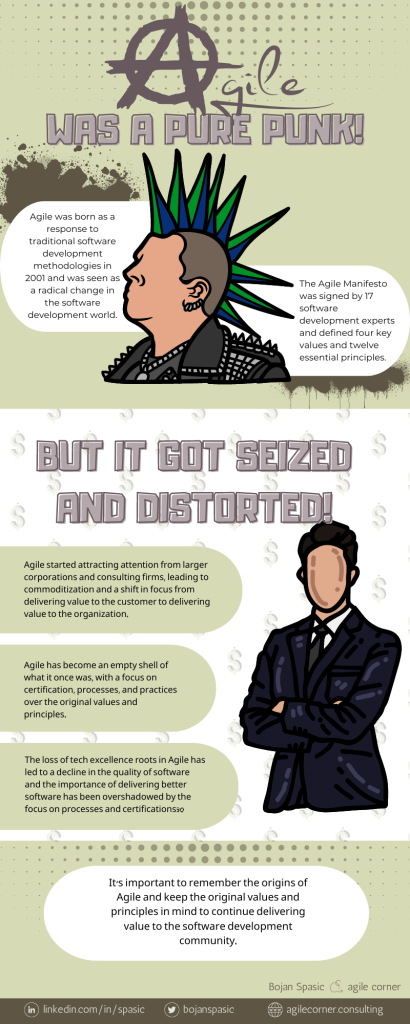
Agile – A Punk Movement
Agile was born in 2001 as a response to the traditional, heavyweight software development methodologies such as Waterfall. The Agile Manifesto, signed by 17 software development experts, was a declaration of four key values: individuals and interactions over processes and tools, working software over comprehensive documentation, customer collaboration over contract negotiation, and responding to change over following a plan.
The Agile approach was seen as a radical change in the software development world, challenging the established norms and promoting a more flexible and adaptive approach. The Agile community was small, tight-knit, and dedicated to delivering better software in a more human-centric way.
Agile – The Corporate Hype
As Agile became more popular, it started to attract the attention of larger corporations and consulting firms. Agile certifications and training programs were introduced, and consulting firms started offering Agile transformation services. This led to the commoditization of Agile, reducing it to a set of practices and processes, rather than a mindset and culture.
Many organizations saw Agile as a way to improve their bottom line, rather than a way to improve the quality of software and the lives of their employees. The focus shifted from delivering value to the customer to delivering value to the organization. Agile became a buzzword, a way to make a quick buck, rather than a way to make better software.
Agile – An Empty Shell of Once-Giant
As a result of the corporate hype and commoditization, Agile has become an empty shell of what it once was. The focus on certification, processes, and practices has overshadowed the original values and principles of Agile. Many organizations implement Agile in name only, without truly embracing the culture and mindset.
Furthermore, the Agile community has become fragmented, with different factions promoting different interpretations and implementations of Agile. The spirit of collaboration and cooperation that once defined the Agile community has been replaced by competition and infighting.
In the end …
Agile has come a long way since its inception as a punk movement. It has fallen prey to certification schemes, consulting frenzy, and organizational status quo reinforcement, and has mostly lost its tech excellence roots. While Agile has brought many benefits to the software development world, it is important to remember its origins and keep the original values and principles in mind. Only then can Agile continue to deliver value and make a positive impact on the software development community.
Special thanks to my friend Ilija Studen for inspiring this post.
